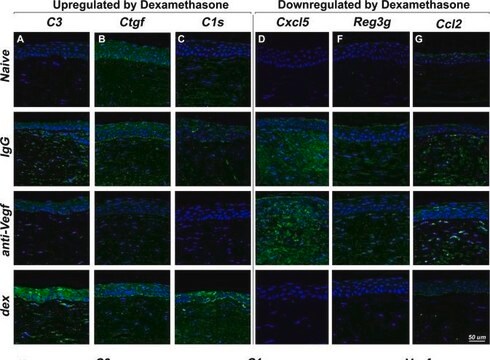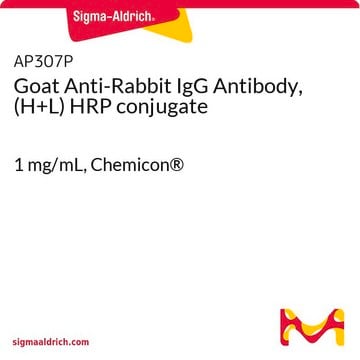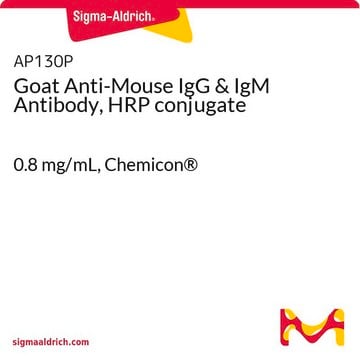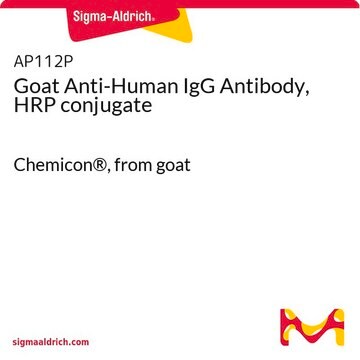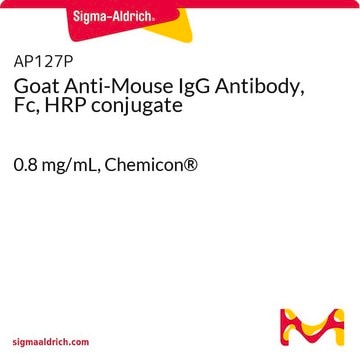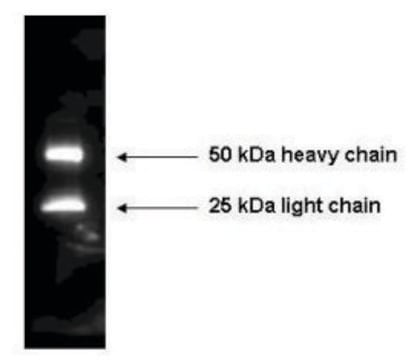おすすめの製品
由来生物
rabbit
品質水準
結合体
peroxidase conjugate
抗体製品の状態
F(ab′)2 fragment of affinity isolated antibody
抗体製品タイプ
secondary antibodies
クローン
polyclonal
化学種の反応性
mouse
メーカー/製品名
Chemicon®
テクニック
ELISA: suitable
western blot: suitable
輸送温度
wet ice
ターゲットの翻訳後修飾
unmodified
詳細
免疫グロブリンG(IgG)は、ヒト血清中に最も豊富に存在する糖タンパク質抗体です。B細胞から分泌されます。IgG構造は、2本の同一の重(H)鎖および2本の同一のλ軽(L)鎖を含む4本のポリペプチド鎖で構成されています。これらの鎖はジスルフィド結合により連結されています。IgGには、IgG1、IgG2、IgG3、およびIgG4の4種のアイソタイプがあります。
アプリケーション
ウサギ抗マウスIgG抗体、HRPコンジュゲートは、ウェスタンブロッティングで使用されています。(1:2000)(1:200000) (1:5000)
生物化学的/生理学的作用
免疫グロブリンG(IgG)は補体系の活性化を助けます。ウイルス粒子および毒素を中和します。IgGは抗体依存性細胞傷害(ADCC)を促進します。母親のIgGは胎盤を介して胎児に移行しますが、これは新生児を感染症から守るために極めて重要です。重症急性呼吸器症候群コロナウイルス(SARS-CoV)-2感染患者におけるIgG濃度の検出は、コロナウイルス疾患2019(COVID-19)の重症度と予後を評価するための戦略となる可能性があります。
法的情報
CHEMICON is a registered trademark of Merck KGaA, Darmstadt, Germany
免責事項
メルクのカタログまたは製品に添付されたメルクのその他の文書に記載されていない場合、メルクの製品は研究用途のみを目的としているため、他のいかなる目的にも使用することはできません。このような目的としては、未承認の商業用途、in vitroの診断用途、ex vivoあるいはin vivoの治療用途、またはヒトあるいは動物へのあらゆる種類の消費あるいは適用などがありますが、これらに限定されません。
Not finding the right product?
Try our 製品選択ツール.
保管分類コード
13 - Non Combustible Solids
WGK
WGK 3
引火点(°F)
Not applicable
引火点(℃)
Not applicable
適用法令
試験研究用途を考慮した関連法令を主に挙げております。化学物質以外については、一部の情報のみ提供しています。 製品を安全かつ合法的に使用することは、使用者の義務です。最新情報により修正される場合があります。WEBの反映には時間を要することがあるため、適宜SDSをご参照ください。
Jan Code
AP160P:
試験成績書(COA)
製品のロット番号・バッチ番号を入力して、試験成績書(COA) を検索できます。ロット番号・バッチ番号は、製品ラベルに「Lot」または「Batch」に続いて記載されています。
この製品を見ている人はこちらもチェック
Cristina Evangelisti et al.
FASEB journal : official publication of the Federation of American Societies for Experimental Biology, 23(12), 4276-4287 (2009-08-29)
MicroRNAs are a class of sophisticated regulators of gene expression, acting as post-transcriptional inhibitors that recognize their target mRNAs through base pairing with short regions along the 3'UTRs. Several microRNAs are tissue specific, suggesting a specialized role in tissue differentiation
Elen Rizzi et al.
International journal of cardiology, 165(1), 165-173 (2011-09-16)
Increased oxidative stress upregulates matrix metalloproteinases (MMPs) and transforming grow factor (TGF-β), which are involved in hypertensive cardiac remodeling. We tested the hypothesis that tempol (an antioxidant) could prevent these alterations in two-kidney, one-clip (2K1C) hypertension. Sham-operated or hypertensive rats
Andrezza N Gonçalves et al.
Journal of biotechnology, 157(1), 20-24 (2011-10-18)
Characterization of the matrix metalloproteinase-2 (MMP-2) substrates and understanding of its function remain difficult because up to date preparations containing minor amounts of other eukaryotic proteins that are co-purified with MMP-2 are still used. In this work, the expression of
S B A Cau et al.
British journal of pharmacology, 164(2), 372-381 (2011-03-26)
Mounting evidence implicates matrix metalloproteinase (MMP) in the vascular dysfunction and remodelling associated with hypertension. We tested the hypothesis that treatment with pyrrolidine dithiocarbamate (PDTC), which interferes with NF-κB-induced MMPs gene transcription, could exert antihypertensive effects, prevent MMP-2 and MMP-9
Neuron-glia communication: metallothionein expression is specifically up-regulated by astrocytes in response to neuronal injury.
Roger S Chung, Paul A Adlard, Justin Dittmann, James C Vickers, Meng Inn Chuah, Adrian K West
Journal of Neurochemistry null
ライフサイエンス、有機合成、材料科学、クロマトグラフィー、分析など、あらゆる分野の研究に経験のあるメンバーがおります。.
製品に関するお問い合わせはこちら(テクニカルサービス)
